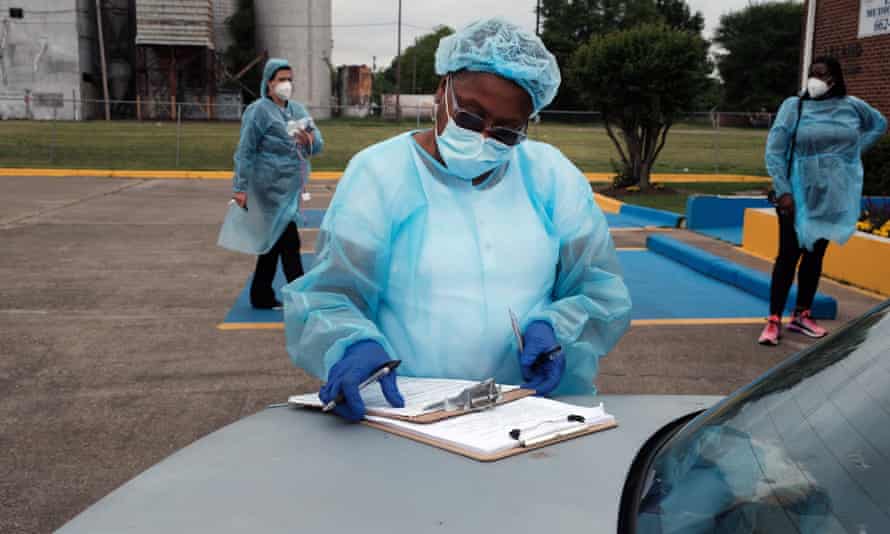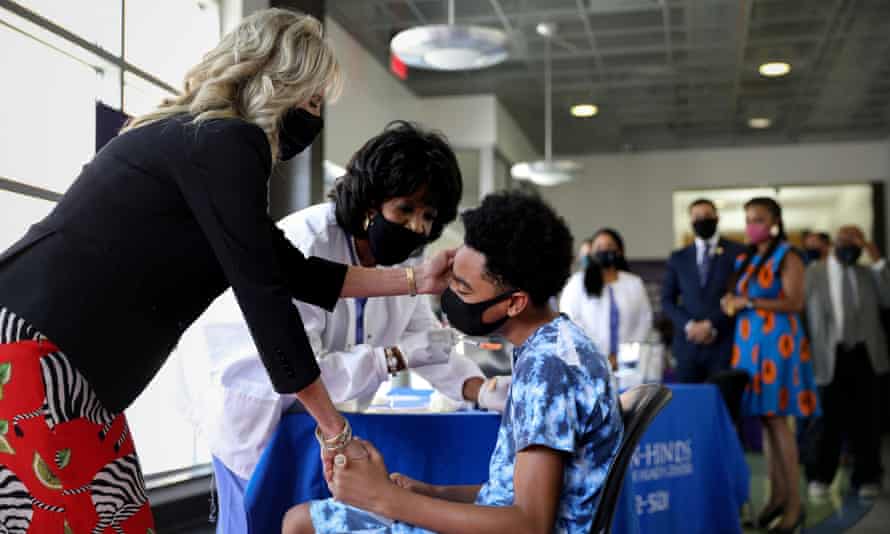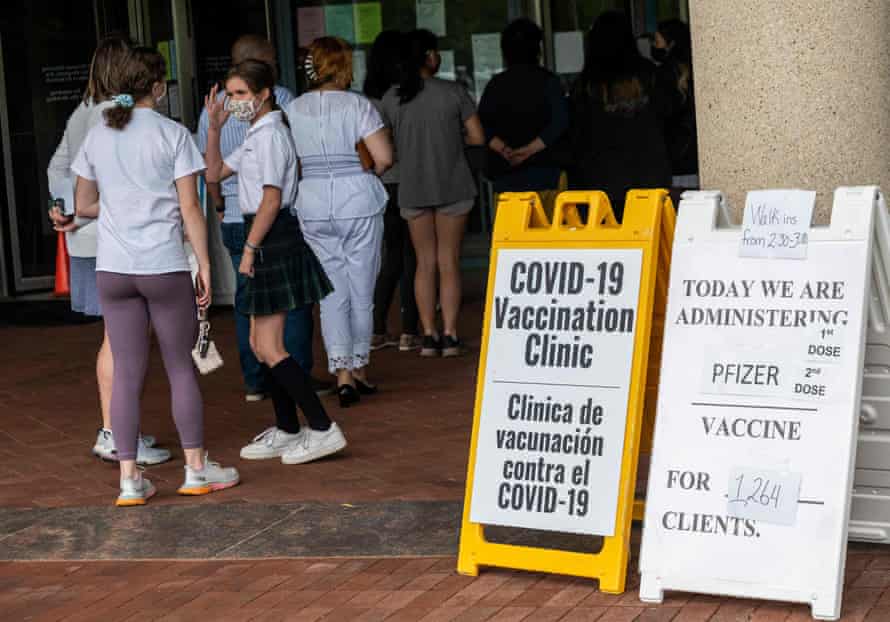US fight against Covid threatened by growing vaccine gap in the south
"Less than 50% of adults in Alabama, Mississippi and Louisiana have received at least one dose of the Covid-19 vaccine

Last modified on Sun 27 Jun 2021 03.31 EDT
In the United States, to bring about a long-awaited end to the Covid-19 pandemic, federal and state health officials have been urging all Americans to get vaccinated. But, amid stagnating national vaccine rates, some states in the south have been lagging behind when it comes to vaccinating their populations, raising fears of deepening regional disparities.
That raises the prospect that for a complex web of reasons much of the southern US will continue to experience the pandemic in a different way than the rest of America. That is especially worrisome as the south contains more communities that are more vulnerable to the virus.
Several southern states, particularly in more rural communities, have vaccination rates that are below the national average, according to data provided by the New York Times. In Alabama, Mississippi and Louisiana, less than 50% of adults have received at least one dose of the Covid-19 vaccine. Georgia, Tennessee, Virginia, South Carolina, and other southern states are currently behind national vaccination rates.
“We’re all swimming against a strong current, in some areas, or pretty strong resistance because of the nature of people thinking together and reinforcing doubts about [the] vaccine in their day to day conversations with friends and family who are resistant to being vaccinated,” said Dr Michael Saag, a professor of medicine and infectious diseases at the University of Alabama at Birmingham.
Last week Joe Biden and Jill Biden made separate trips to southern states to visit vaccination sites and urge people in the region to get the vaccine.

Reasons for the gap in vaccination rates between northern and southern states are disparate and complicated. Hesitancy towards the vaccine, either given an underestimation of the pandemic in general or a fear of fast-developed technology, has been a road block for many. Combined with a generally poor medical infrastructure and many southern state officials providing mixed signaling on vaccinations, lower vaccination rates in the south continue.
“There are a lot of different pieces playing a role in why we are where we are,” said Dr Susan Hassig, an associate professor of epidemiology at the Tulane School of Public Health and Tropical Medicine.
Even amid the complexity behind the reasons for lowered vaccination rates, the consequences remain clear. The wide-majority of continued Covid-19 deaths are among unvaccinated people. The Delta variant of Covid-19, a more contagious and deadly strain of coronavirus that is currently on the rise, poses an additional threatto pockets of people who do not get the vaccine.
The political undercurrents behind vaccine hesitancy are hard to miss.
Throughout the pandemic, Republican politicians – locally and federally – have pushed for ending Covid-19 health measures like mask wearing and social distancing in favor of reopening businesses. More recently, Republican governors have shrugged off concerns of low vaccination rates, including the Mississippi governor, Tate Reeves, despite Mississippi having the lowest vaccination rates nationwide.
Data also suggests that those living in rural, Republican stronghold areas, and white Republicans in general, tend to be more resistant to the idea of getting vaccinated. According to Forbes, all 16 states that have met the July 4th goal of having at least 70% of their adult population receive one Covid-19 vaccine voted for Democrat Joe Biden in 2020. Additionally, southern cities like New Orleans, as noted by Hassig, which are usually more liberal, have much higher vaccination rates than their rural counterparts.
“The common denominator is that these are Republicans stronghold states. These are all deep red states so what we’re seeing in the US is the partisan divide around vaccination rates,” said Dr Peter Hotez, the dean of the National School of Tropical Medicine at Baylor College of Medicine and the co-director of the Center for Vaccine Development at Texas Children’s Hospital.
But reducing hesitancy to an extension of political identity can miss the other nuances inherent to vaccine resistance. For many in the south, especially communities that have limited access to often-online Covid-19 information, fear of the vaccine’s short and long-term impact can drive hesitancy, according to Hassig. Similarly, mistrust and confusion around public health information can drive vaccine resistance for many, a sentiment shared across political divides.
“Hesitancy is a [catch-all] term that is a front for a very heterogeneous array of components that each need their own approach to address,” said Hassig.
Structural inequalities in southern communities, including a limited medical infrastructure, can also be an explanation for lower vaccination rates.
Southern states, in urban and rural communities, can also struggle with a lack of health infrastructure, restricting a person’s access to vaccine information and the ability to make an appointment.

In rural areas across the US there are “hospital deserts” where no medical facility exists for many miles. Rural communities and many southern cities such as Atlanta and Memphis can also have “pharmacy deserts”, areas where a pharmacy is difficult to access.
Additionally, uninsured people, who are less likely to be connected with a healthcare provider that can provide information on the Covid vaccination process, are disproportionately concentrated in the south, according to data from the US Census Bureau.
Especially for Black and brown residents in the south, who are disproportionately affected by lack of pharmacies and health insurance, vaccination clinics tend to be located away from communities of color, making the vaccination process even more difficult.
In the face of lowered vaccination rates, responses have varied. On a federal level, the Biden administration has implemented programs and campaigns specifically aimed at encouraging vaccines in the region. Biden and the vice-president, Kamala Harris, have also each taken trips to southern states in an attempt to bolster vaccination rates ahead of the July 4th goal.
Local health officials have also taken targeted steps to increase the amount of vaccines in their communities, leaning on community leaders to encourage vaccinations and dispel myths as well as implementing pop-up, sometimes mobile, vaccination clinics in hard-to-reach communities.
But with the mounting threat of the Delta variant and the gap in vaccinations in the south slowly narrowing, experts are concerned about how to more quickly get southern people, especially people of color, vaccinated and protected.
“All of those things have pretty much been employed, at least in my community, that I’ve seen first-hand and it is effective to a point, but we aren’t getting where we need to be in terms of a portion of people in our state who have been vaccinated,” said Saag."
No comments:
Post a Comment